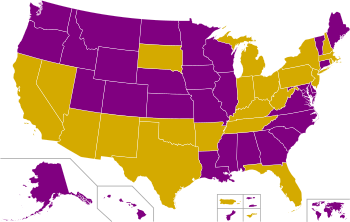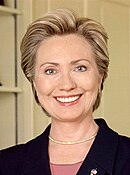2008 Democratic Presidential Primary
|
|
||||||||||||||||||||||
|---|---|---|---|---|---|---|---|---|---|---|---|---|---|---|---|---|---|---|---|---|---|---|
|
||||||||||||||||||||||
|
||||||||||||||||||||||

First place by first-instance vote
|
||||||||||||||||||||||
|
||||||||||||||||||||||
The 2008 Democratic presidential primaries were the selection processes by which voters of the Democratic Party chose its nominee for President of the United States in the 2008 U.S. presidential election. Senator Barack Obama of Illinois was selected as the nominee, becoming the first African-American to secure the presidential nomination of any major political party in the United States. However, due to a close race between Obama and Senator Hillary Clinton of New York, the contest remained competitive for longer than expected, and neither candidate received enough pledged delegates from state primaries and caucuses to achieve a majority, without endorsements from unpledged delegates (superdelegates).
The presidential primaries actually consisted of both primary elections and caucuses, depending upon what the individual state chose. The goal of the process was to elect the majority of the 4,233 delegates to the 2008 Democratic National Convention, which was held from Sunday, August 25, through Wednesday, August 28, 2008, in Denver, Colorado. To secure the nomination, a candidate needed to receive at least 2,117 votes at the convention—or a simple majority of the 4,233 delegate votes. This total included half-votes from American Samoa, Guam, the United States Virgin Islands, and Democrats Abroad, as well as "superdelegates", party leaders and elected officials who were not chosen through a primary or caucus. The race was further complicated by a controversy over the scheduling of the Michigan and Florida state primaries, which had been scheduled earlier than party rules permitted, affecting the number of delegates that those states sent to the national convention.
...
Wikipedia


